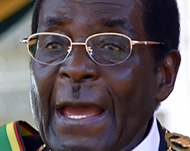Zimbabwe sets new inflation record
Zimbabwe’s soaring inflation has topped 1000%, causing misery for locals as prices rise and the country’s economic crisis worsens.

The Central Statistical Office said on Friday the year-on-year inflation rate in April was 1,042.9%, up 129.3 percentage points from March, in an economy considered to be shrinking faster than that of any other country in the world not at war.
“This means that on average goods and services normally purchased by households for final use in Zimbabwe were about 11 times as expensive in April 2006 as they had been 12 months before,” Moffat Nyoni, the CSO’s acting director, told a news conference.
“A bundle of goods and services that cost 100,000 Zimbabwean dollars (US $1) in April 2005 would on average cost 1,142,900 dollars in April 2006,” he said.
The announcement from the CSO had been expected two days earlier but had been delayed.
Inflation aside, Zimbabwe’s economy has been devastated by soaring poverty, 70% unemployment and severe shortages of fuel and staple foods in a nation once known as Africa’s breadbasket.
Crisis genesis
The nation’s economic woes began after the Robert Mugabe, the country’s president, began a programme of seizing white-owned commercial farms for blacks.
The government also plans to acquire a 51% stake in all foreign-owned mines will keep external funding at bay.
Economists now say the inflation rate could end the year at around 1,800%.
 |
|
Mugabe blames political rivals for |
However, Mugabe says the poor state of the economy is because of sabotage by his political opponents and the international community.
Harare resident Tawanda Rwazemba, a 24-year-old clerk, says it takes hours to look through the shelves of local supermarkets and work out prices for foodstuffs.
For a two-litre pack of orange juice, Rwazemba has to pay Z$500,000, the same price for two kilogrammes of rice, while a kilogramme of beef can cost up to one million Zimbabwean dollars.
He earns just under $200 a month.
“This is unbearable. Can you imagine – we are millionaires but we can’t afford much,” Rwazemba said. “It can’t be a life where you just wake up to find that prices have gone up, how do you plan for that?”
Changing prices
Some shops have even stopped putting prices on food because the prices change so often.
Analysts say most Zimbabweans are barely managing to survive, with some families living on only one meal a day, and warn that the anger many feel over such hardships could cause unrest.
“There is a lot of anger over the economic hardships, and if you combine this with the political conditions, we have an explosive social environment,” Eldred Masunungure, from the political science department at the University of Zimbabwe, said.
“We are right on the edge, and politically what is going to be interesting is how both the government and the opposition are going to play the game.”